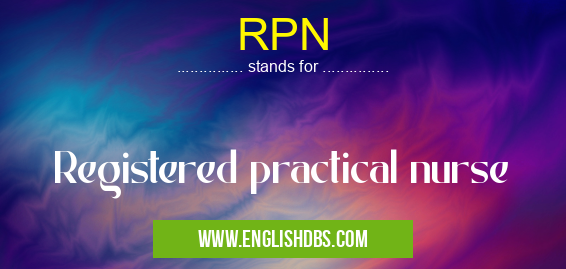What does RPN mean in HEALTHCARE
In the medical field, RPN stands for Registered Practical Nurse. They are healthcare professionals who provide essential nursing care under the supervision of a registered nurse (RN) or a physician. RPNs play a crucial role in patient care and work in various healthcare settings.

RPN meaning in Healthcare in Medical
RPN mostly used in an acronym Healthcare in Category Medical that means Registered practical nurse
Shorthand: RPN,
Full Form: Registered practical nurse
For more information of "Registered practical nurse", see the section below.
» Medical » Healthcare
Responsibilities of an RPN
- Patient assessment and monitoring: RPNs assess patients' physical and mental health status, monitor vital signs, and report any changes to the RN or physician.
- Medication administration: They administer medications as prescribed by the physician, ensuring accuracy and patient safety.
- Wound care and dressings: RPNs provide wound care, apply dressings, and monitor wound healing to prevent infections.
- Patient education: They educate patients on health conditions, medication use, and lifestyle modifications to promote well-being.
- Care coordination: RPNs collaborate with other healthcare professionals to ensure continuity of care and patient transitions.
Education and Training
To become an RPN, individuals must complete a practical nursing program approved by the relevant regulatory body in their jurisdiction. These programs typically take one to two years and include a combination of classroom instruction, clinical practice, and hands-on experience.
Scope of Practice
The scope of practice for RPNs varies depending on the jurisdiction. However, they generally provide care in:
- Hospitals
- Long-term care facilities
- Home health agencies
- Clinics
- Community health centers
Essential Questions and Answers on Registered practical nurse in "MEDICAL»HEALTHCARE"
What is a Registered Practical Nurse (RPN)?
An RPN is a healthcare professional who provides nursing care to individuals in a variety of settings, including hospitals, clinics, and long-term care facilities. RPNs are responsible for assessing patients' health, administering medications, and providing wound care.
What are the educational requirements to become an RPN?
To become an RPN, an individual typically needs to complete a two-year diploma program at an accredited nursing school. This program includes coursework in nursing theory, clinical skills, and pharmacology.
What are the job responsibilities of an RPN?
RPNs are responsible for providing direct patient care, which may include:
- Assessing patients' health
- Administering medications
- Providing wound care
- Monitoring patients' vital signs
- Educating patients and their families about health conditions
What are the differences between an RPN and an RN (Registered Nurse)?
RPNs and RNs are both licensed nurses, but there are some differences in their education, scope of practice, and job responsibilities. RPNs typically have a two-year diploma in nursing, while RNs have a four-year bachelor's degree in nursing. RNs also have a broader scope of practice and are able to perform more complex nursing tasks, such as starting IVs and managing complex wounds.
What is the job outlook for RPNs?
The job outlook for RPNs is expected to be good over the next few years. The aging population and the increasing number of people with chronic diseases will create a growing demand for RPNs.
Final Words: RPNs are essential members of the healthcare team who provide vital nursing care to patients. Their education, training, and experience equip them with the skills and knowledge necessary to assist in maintaining patient health and well-being. By understanding the meaning of RPN, individuals can recognize the important role these healthcare professionals play in providing quality care.
RPN also stands for: |
|
| All stands for RPN |
